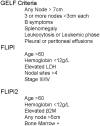Therapy of newly diagnosed follicular lymphoma
- PMID: 23248775
- PMCID: PMC3518764
- DOI: 10.3389/fonc.2012.00188
Therapy of newly diagnosed follicular lymphoma
Abstract
Newly diagnosed follicular lymphoma is relatively common and can be effectively treated with several differing approaches. Although the disease is often considered incurable, it is highly responsive to therapy when indicated. This review discusses the indications for treatment, risk stratification systems, treatment options with supporting clinical trial data, and expected therapeutic outcomes in newly diagnosed follicular lymphoma.
Keywords: B cell; chemotherapy; follicular lymphoma; immunotherapy; lymphoma; newly diagnosed; observation; outcomes.
Figures
Similar articles
-
Rituximab: a review of its use in non-Hodgkin's lymphoma and chronic lymphocytic leukaemia.Drugs. 2003;63(8):803-43. doi: 10.2165/00003495-200363080-00005. Drugs. 2003. PMID: 12662126 Review.
-
Therapeutic approaches in patients with newly diagnosed follicular lymphoma.Future Oncol. 2014 Oct;10(12):1967-80. doi: 10.2217/fon.14.104. Future Oncol. 2014. PMID: 25386813 Review.
-
Current therapeutic strategies and new treatment paradigms for follicular lymphoma.Cancer Treat Res. 2015;165:197-226. doi: 10.1007/978-3-319-13150-4_8. Cancer Treat Res. 2015. PMID: 25655611 Review.
-
Outcomes after R-CHOP in patients with newly diagnosed advanced follicular lymphoma: a 10-year follow-up analysis of the JCOG0203 trial.Lancet Haematol. 2018 Nov;5(11):e520-e531. doi: 10.1016/S2352-3026(18)30155-8. Lancet Haematol. 2018. PMID: 30389034 Clinical Trial.
-
Cutaneous Disease as a Rare Presentation of Follicular Lymphoma Progression.J Investig Med High Impact Case Rep. 2021 Jan-Dec;9:2324709621997260. doi: 10.1177/2324709621997260. J Investig Med High Impact Case Rep. 2021. PMID: 33629605 Free PMC article.
References
-
- Advani R., Forero-Torres A., Furman R. R., Rosenblatt J. D., Younes A., Shankles B., et al. (2006). SGN-40 (anti-huCD40 mAb) monotherapy induces durable objective responses in patients with relapsed aggressive non-Hodgkin’s lymphoma: evidence of antitumor activity from a phase I study. Blood 108 abstr. 695
-
- Advani R. H., Buggy J. J., Sharman J. P., Smith S. M., Boyd T. E., Grant B., et al. (2012). Bruton tyrosine kinase inhibitor ibrutinib (PCI-32765) has significant activity in patients with relapsed/refractory B-cell malignancies. J. Clin. Oncol. 10.1200/jco.2012.42.7906 [Epub ahead of print]. - DOI - PMC - PubMed
-
- Al-Tourah A. J., Gill K. K., Chhanabhai M., Hoskins P. J., Klasa R. J., Savage K. J., et al. (2008). Population-based analysis of incidence and outcome of transformed non-Hodgkin’s lymphoma. J. Clin. Oncol. 26 5165–5169 - PubMed
-
- Ardeshna K., Smith P., Qian W., Warden J., Stevens L., Pocock C., et al. (2010). An intergroup randomised trial of rituximab versus a watch and wait strategy in patients with stage II, III, IV, asymptomatic, non-bulky follicular lymphoma (grades 1, 2 and 3a). A preliminary analysis. Blood 116 abstr. 6
LinkOut - more resources
Full Text Sources


